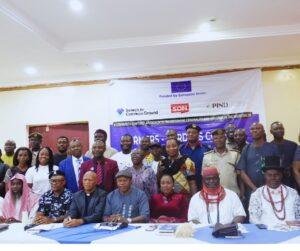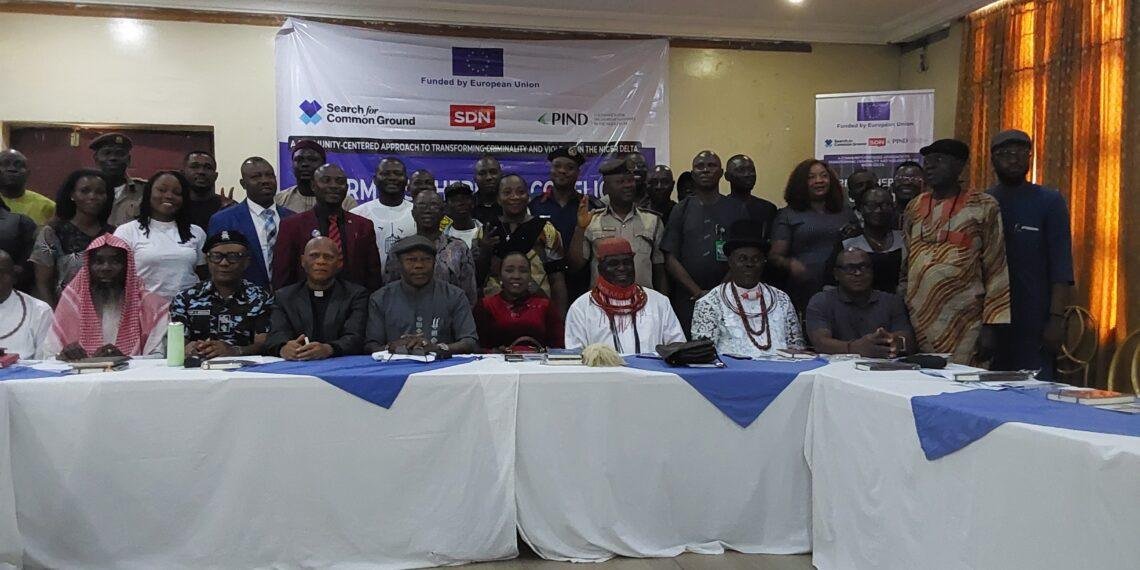A state-level multi-stakeholder dialogue on farmers–herders conflict was on Friday convened in Warri by the Search for Common Ground (SFCG) and its partners with the aim of fostering peaceful coexistence and advancing solutions to the recurring crisis in Delta State.
The meeting, held at the Best Western Wetland Hotel, was organised under the European Union–funded project community centred approach to transforming criminality and violence in the Niger Delta.
It was implemented in collaboration with Stakeholder Democracy Network, Partnership Initiative in the Niger Delta (PIND), traditional rulers, religious leaders, security agencies, government officials, and civil society actors.
Participants included representatives of Miyyetti Allah, Jama’atu Nasril Islam (JNI), Christian Association of Nigeria (CAN), community peace actors local peace actors, state peace actors, youth groups, and security agencies.
Key issues highlighted during the dialogue included support for the Delta State Livestock Breeding and Rearing Law 2021, particularly its ban on open grazing and provision for a livestock management committee.

Stakeholders also committed to strengthening collaboration between farmers, herders, and government institutions through inclusive decision-making, early warning platforms, and accountability measures.
Other recommendations centred on enhanced security, such as safeguarding forests, regulating intruders, and setting up task forces to identify criminal elements, alongside initiatives to strengthen ties between community leaders, herders’ associations, and peace structures.
Chairman of Udu Local Government Area, Mr. Vincent Oyibode who spoke during the opening, underscored the need for accountability, insisting that both herders’ and farming communities must take responsibility for their members.
Dr. Ngozi Mugulu, Permanent Secretary of the Delta State Ministry of Youth Development and Chairperson of the State Peace Architecture, described the dialogue as “very fruitful,” noting that it had revealed “a number of measures, not just one, not just two—that can be implemented to foster peace between farmers and herders.”
She stressed that peaceful coexistence was not only possible but necessary. “There are many countries where farmers and herders coexist peacefully without conflict. Each group makes important economic contributions—farmers contribute in their own way, and herders contribute in theirs.
“Neither of them can live without the other. Herders cannot depend on meat alone without food, and farmers cannot rely on food alone without meat. So, we must coexist because our peaceful coexistence will maximize the output of each party,” Mugulu said.
Also speaking, Dr. Matthew Egbi Owahwa II, the Okobaro of Ughievwen Kingdom, called for stronger enforcement of existing laws, lamenting that complaints against herders were often downplayed by security agencies.
According to the monarch who represented the Chairman of Delta State Traditional Rulers Council, Major General Mujakperuo Agho (rtd), Orhue 1, the Orodje of Okpe Kingdom, traditional rulers, village heads, and sub-chiefs must work together in curbing the menace.
Deputy Clerk of the Delta State House of Assembly, Smart Edoge, said his expectation was that the dialogue would translate into tangible action. “So many recommendations have been outlined, practical things that can sustain peace between both groups. What is left now is the proper implementation of these ideas that we have agreed upon here today,” he stated.
Read Also:
- 2 soldiers killed in fresh farmers-herders clash in Taraba
- Delta SUBEB inaugurates Young Farmers Club to boost agriculture
- Gov. Mohammed moves to quell farmers, herders clash in Bauchi
Edoge who also a former chairman of the forum recalled that during his tenure, the forum recommended banning night grazing, ensuring cattle were marked for identification, and discouraging children from herding cattle. “Unfortunately, most of those recommendations were not implemented. Instead, new issues keep coming up. Now that we have the Delta State Anti-Open Grazing Law, which actually gives legal backing to many of these suggestions, it is the duty of government, security agencies, and stakeholders to ensure it is implemented to the letter,” he added.
On his part, Mustafa Suleiman, state Secretary of Miyetti Allah Cattle Breeders Association of Nigeria (MACBAN), emphasised the importance of profiling herders and fully implementing the 2021 Anti-Open Grazing Law, which he argued protects both farmers and herders. “If we profile the herders and the government issues a license—through the permission of the LGA chairman and the community leaders—then whoever comes through that process will have a record. If they do anything wrong, they can be held accountable. If the state government strengthens this aspect, we will achieve greater success,” he explained.
Suleiman noted that in Udu Local Government, cooperation with authorities had already reduced tensions, and he called for such models to be replicated across the state. He also urged greater support for Agro Rangers, a special unit under the Nigeria Security and Civil Defence Corps tasked with addressing farmers–herders conflict, and advocated synergy between MACBAN and security agencies for intelligence sharing.
Addressing allegations that herders carry arms, Salmi insisted that professional herders do not bear weapons. “Long before now, herders only used a stick and a knife. The stick is for controlling cattle, while the knife is for protection against wild animals and for religious purposes, especially to slaughter sick animals so they do not die on their own and become useless to us,” he clarified.
The dialogue ended with stakeholders pledging continued engagement, advocacy, and support for laws that encourage peaceful coexistence across Delta communities.






